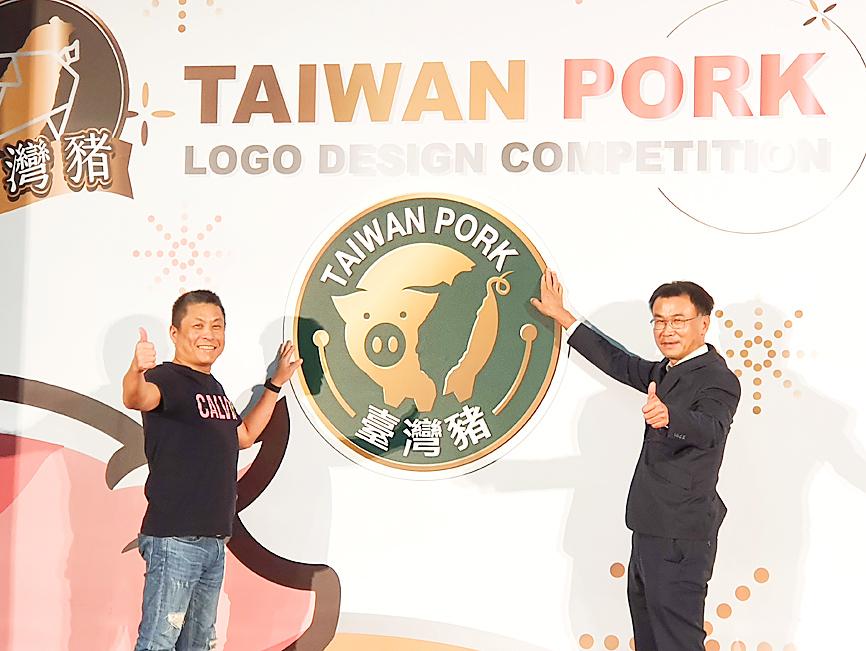Members of the public yesterday called into question the credibility of the government-certified “Taiwan Pork” label after braised pork rice chain Formosa Chang (鬍鬚張) was found to use the label for some products containing Spanish pork.
Although Taiwan bans the use of ractopamine on local hog farms, the Legislative Yuan on Thursday approved nine administrative directives related to the government’s decision to lift restrictions on the importation of US pork containing traces of the feed additive and beef from cattle aged more than 30 months.
The promotion of local pork through the “Taiwan Pork” label is a government measure designed to mitigate the effects of lifting restrictions on US pork imports.

Photo: Chien Hui-ju, Taipei Times
The Council of Agriculture (COA) in October launched the label, saying that businesses selling local pork could apply to use it from last month.
The National Animal Industry Foundation would review applications and issue the labels to qualified applicants, the council said at that time, encouraging consumers to report label misuse.
Formosa Chang said it was approved to use “Taiwan Pork” labels throughout the nation, but customers reported that one of its lunchboxes, braised pork with anka, contained pork from Spain.
Under the Act Governing Food Safety and Sanitation (食品安全衛生管理法), companies falsely labeling products could face a fine of up to NT$4 million (US$140,090).
Formosa Chang said it had informed the foundation that a few of its products did not use local pork, but the foundation still approved it to use the label.
The restaurant chain yesterday stopped selling the lunchbox so that its products would comply with the label regulations.
Foundation executive director Wang Chung-shu (王忠恕) confirmed that Formosa Chang did reveal its use of Spanish pork in the product during the application process.
The foundation approved its application because the company said that it would be out of pork from Spain by the end of the year, Wang added.
As this month is a trial run of the label, the Food and Drug Administration (FDA) would decide whether to fine the company, he said.
Dumpling chain Bafang Yunji International Co (八方雲集) uses pork from Spain in some stores in northern Taiwan, but only local pork in the rest of the country, so it was approved to use the label in central and southern Taiwan, Wang said.
Commenting on the confusion, Wang said that the foundation would visit businesses approved to use the label to review their pork ingredients and ensure correct labeling.
Businesses that use imported pork can use FDA-certified labels, which would allow them to specify the pork’s origin, COA Deputy Minister Huang Chin-cheng (黃金城) said.
Yesterday, the Executive Yuan evaluated whether to nullify new food safety regulations promulgated by some local municipalities that demand “ractopamine-free” products, sources said.
Before deciding, the Executive Yuan would continue to communicate with local governments, hoping that they drop local ractopamine regulations, a Cabinet official said on condition of anonymity.
Among the Legislative Yuan’s approved directives on Thursday was one stipulating that imported pork products are allowed to contain ractopamine residue of up to 0.01 parts per million (ppm) in meat and skin, 0.04ppm in pig liver and kidney parts, and 0.01 ppm in other edible parts.
The lifting of the import restrictions and the administrative directives take effect on Friday.
Additional reporting by Lee Hsin-fang and CNA

Taiwanese can file complaints with the Tourism Administration to report travel agencies if their activities caused termination of a person’s citizenship, Mainland Affairs Council Minister Chiu Chui-cheng (邱垂正) said yesterday, after a podcaster highlighted a case in which a person’s citizenship was canceled for receiving a single-use Chinese passport to enter Russia. The council is aware of incidents in which people who signed up through Chinese travel agencies for tours of Russia were told they could obtain Russian visas and fast-track border clearance, Chiu told reporters on the sidelines of an event in Taipei. However, the travel agencies actually applied

New measures aimed at making Taiwan more attractive to foreign professionals came into effect this month, the National Development Council said yesterday. Among the changes, international students at Taiwanese universities would be able to work in Taiwan without a work permit in the two years after they graduate, explainer materials provided by the council said. In addition, foreign nationals who graduated from one of the world’s top 200 universities within the past five years can also apply for a two-year open work permit. Previously, those graduates would have needed to apply for a work permit using point-based criteria or have a Taiwanese company

The Shilin District Prosecutors’ Office yesterday indicted two Taiwanese and issued a wanted notice for Pete Liu (劉作虎), founder of Shenzhen-based smartphone manufacturer OnePlus Technology Co (萬普拉斯科技), for allegedly contravening the Act Governing Relations Between the People of the Taiwan Area and the Mainland Area (臺灣地區與大陸地區人民關係條例) by poaching 70 engineers in Taiwan. Liu allegedly traveled to Taiwan at the end of 2014 and met with a Taiwanese man surnamed Lin (林) to discuss establishing a mobile software research and development (R&D) team in Taiwan, prosecutors said. Without approval from the government, Lin, following Liu’s instructions, recruited more than 70 software

Taiwanese singer Jay Chou (周杰倫) plans to take to the courts of the Australian Open for the first time as a competitor in the high-stakes 1 Point Slam. The Australian Open yesterday afternoon announced the news on its official Instagram account, welcoming Chou — who celebrates his 47th birthday on Sunday — to the star-studded lineup of the tournament’s signature warm-up event. “From being the King of Mandarin Pop filling stadiums with his music to being Kato from The Green Hornet and now shifting focus to being a dedicated tennis player — welcome @jaychou to the 1 Point Slam and #AusOpen,” the